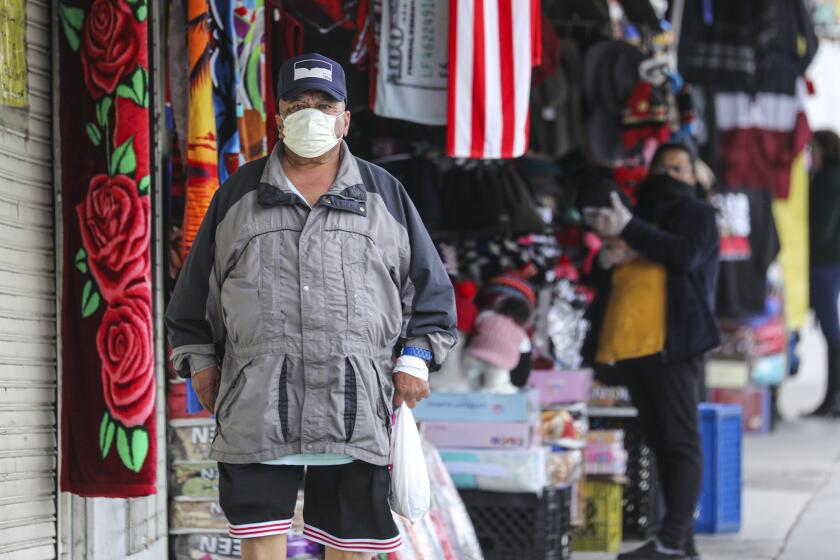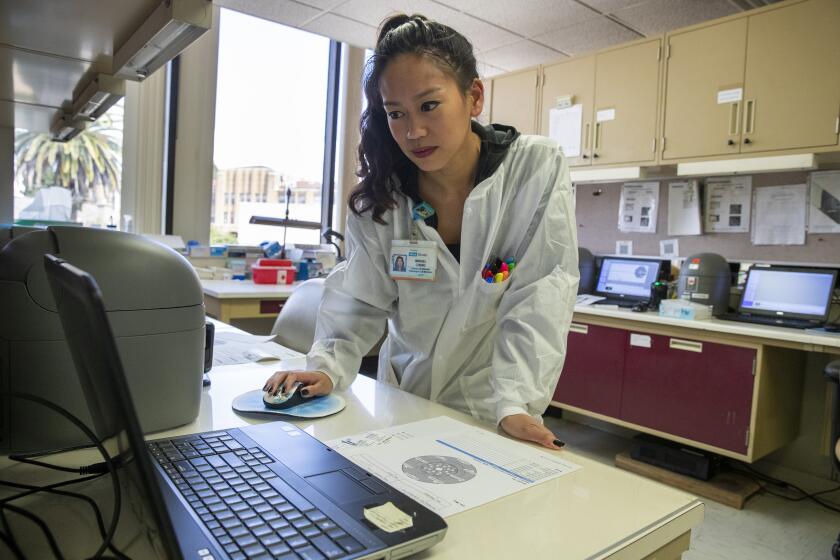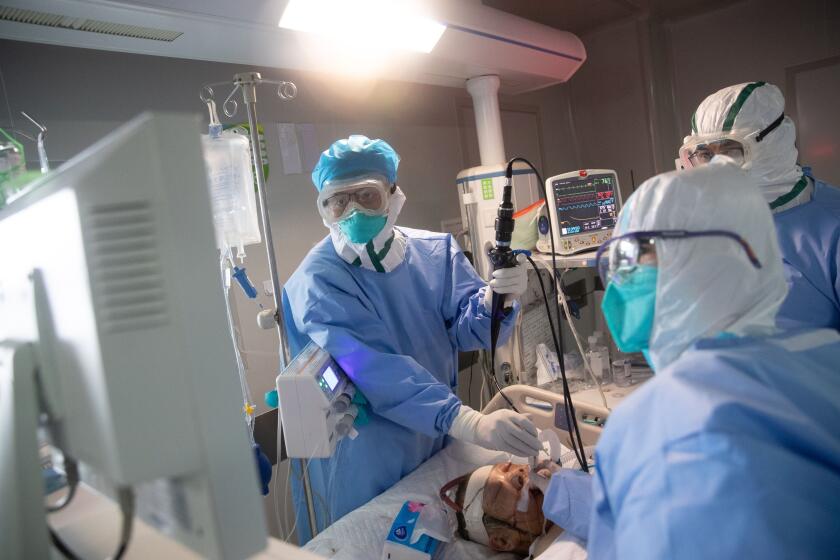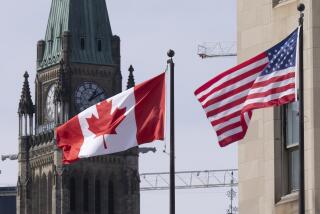Canada bars entry of most foreigners; Americans exempt for now
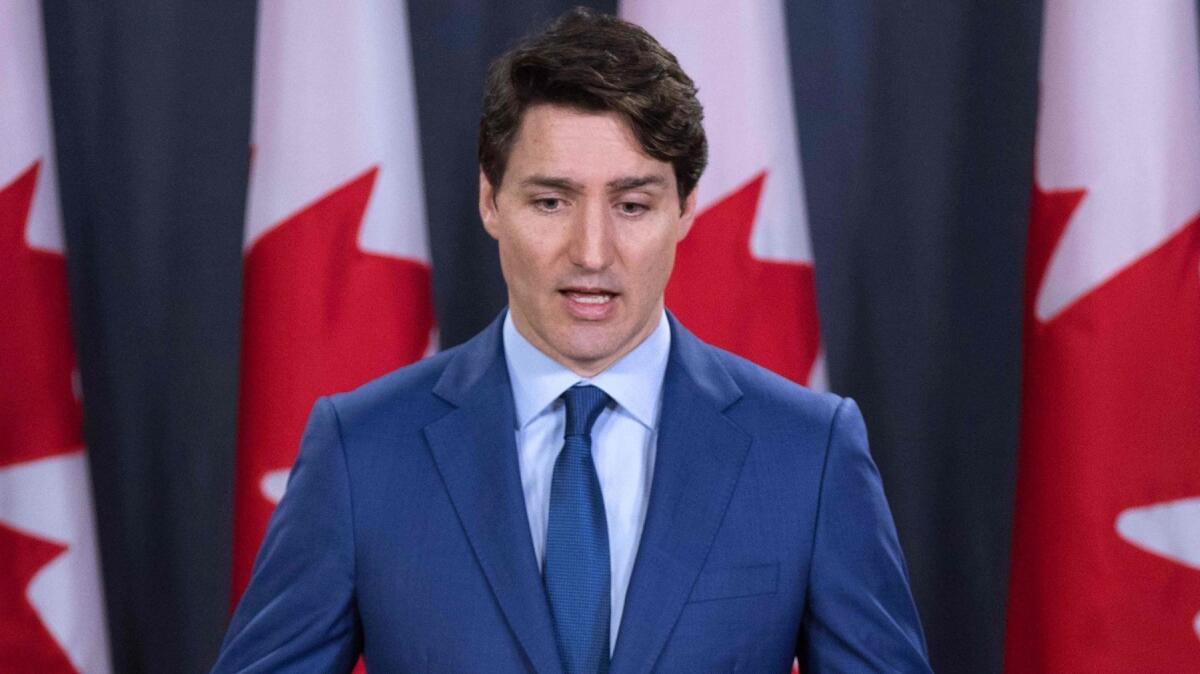
- Share via
MONTREAL — As the coronavirus threat continued to spread across the globe, Canada took sweeping measures Monday to fight the threat, restricting entry into the country of most noncitizens but not, at least for a time, Americans.
By closing its borders to all except, among others, its own citizens, permanent residents of the country, diplomats, flight crews and Americans, Canada took what Prime Minister Justin Trudeau called “an exceptional step ... but it is the right step to be taken today.“
Speaking outside Rideau Cottage, the home in Ottawa to which he has withdrawn after tests showed his wife contracted the virus, Trudeau said that the measures were necessary because “our first preoccupation is, and always will be, the health of Canadians.“
The closing of the border was accompanied by other dramatic steps designed to minimize the spread of the virus, which accounted for 407 cases nationwide through the weekend, with 31 additional confirmed cases in Ontario alone by the time of Trudeau’s appearance at midday. Patty Hajdu, the health minister, said new cases across Canada were due to “community transmission,” meaning that the virus now was being transmitted domestically rather than from abroad.
The new measures include asking all who enter the country from abroad, including the United States, to self-isolate for 14 days; instructing airlines to prohibit the travel into Canada of any person, including Canadians, likely to have the virus after screening; creating plans to offer assurance of financial assistance to Canadians stranded abroad; and offering financial aid to those whose economic security has been undermined because their employment has been curtailed or ended. The prime minister said he understood the frustration of Canadians “and that is why we are assuring that more will be done.”
He did not specify which further steps are being contemplated, though he left open the possibility that more stringent restrictions might be imposed on travel between the United States and Canada. About 13 million American citizens traveled to Canada in 2019.
Trudeau said that he had spoken several times with President Trump in recent days and that the exemptions for Americans would apply “for the moment.”
He and some of his Cabinet ministers made it clear that the situation was being evaluated constantly and could change. “We will not rule out anything that will help to keep Canadians safe,” Trudeau said. He added that what he called the level of integration of our two economies placed the United States “in a separate category from the rest of the world.”
At a White House news briefing, Trump was asked whether he’d consider shutting the U.S.-Canada border. “We think about it,” he replied. “We have very strong emergency powers when it comes to something like this, both on the southern and the northern borders.” He added: “Right now, we have not decided to do that.”
These developments here came as the country’s leading air carrier, Air Canada, cut its flights by half while the second-largest carrier, WestJet Airlines, cut 60% of its international flights and 40% of its domestic flights. Tim Hortons, the Canadian doughnut and coffee outlet, announced it would close its dining rooms; some provinces urged the closing of restaurants and bars.
Toronto’s city-operated day-care centers, parks and zoo were closed; ski areas across the country ceased operations, many for the remainder of the season. Saskatchewan and Newfoundland and Labrador provinces canceled school classes; and dentists, who already had aired concerns about the supply of masks, began to curtail their services in Ontario and Quebec and would offer only emergency care.
Get the latest coronavirus updates from our staff in California and around the world.
“We need to act now and act together,” said Dr. Theresa Tam, Canada’s chief public health officer. She said there were efforts underway to “pull together mechanisms for bulk purchases“ of supplies such as testing kits. “We are absolutely working together to get those supplies the health system needs.”
Matthew Pegg, who heads Toronto’s Office of Emergency Management, asked city employees who do not need to self-isolate to continue reporting to work. He said that the anxiety and fear being felt in the city and across the country were “normal and healthy responses to a very abnormal situation.”
Eileen de Villa, the city’s medical health officer, recommended that food outlets offer only takeout services and that venues such as theaters be closed. She warned that “businesses that choose to defy these recommendations” would be vulnerable to prosecution.
Canadian officials at all levels repeatedly emphasized the communal character of Canada. “We pull together and we look after each other,” the prime minister said. He asked that Canadians shopping for groceries ask neighbors whether they needed any supplies and that shoppers “buy only what you need at the store.”
Arguing that “these are extraordinary times,” Howard Njoo, the national deputy chief public health officer, said the public should avoid gatherings of 50 or more people. Quebec Premier Francois Legault urged residents here to take walks while exercising social distancing.
Despite the new travel restrictions, flights from the United States — many filled with “snowbirds,” as Canadians who spend time in Florida and other warm American venues in the winter months are called — can land at their original airport destinations. Flights from other nations are being restricted to airports in Vancouver, Calgary and Montreal, as well as Toronto’s Pearson airport.
Domestic flights are not restricted. Marc Garneau, the transportation minister, said flight restrictions would not apply to travelers in transit to another country. In addition, the new measures will carve out exemptions from self-isolation for certain “essential workers,” including crews on rail, air and marine vessels and truck drivers making regular journeys across the border.
“This is a situation we are reviewing constantly,” Deputy Prime Minister Chrystia Freeland said. She said that the continent-wide border with the United States was “absolutely vital to the daily life of people who live on both sides of that border” but that the stream of American tourists into the country would be limited because the 14-day self-isolation was not something that visitors “would want to do for a holiday.”
Shribman is a special correspondent.
More to Read
Sign up for Essential California
The most important California stories and recommendations in your inbox every morning.
You may occasionally receive promotional content from the Los Angeles Times.
